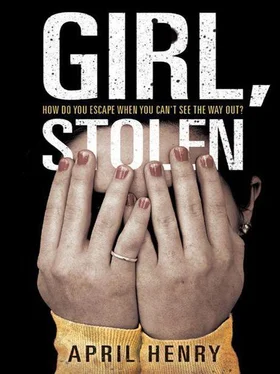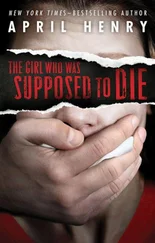April Henry - Girl, Stolen
Здесь есть возможность читать онлайн «April Henry - Girl, Stolen» весь текст электронной книги совершенно бесплатно (целиком полную версию без сокращений). В некоторых случаях можно слушать аудио, скачать через торрент в формате fb2 и присутствует краткое содержание. Город: London, Год выпуска: 2012, ISBN: 2012, Издательство: Walker Books, Жанр: Триллер, ya, на английском языке. Описание произведения, (предисловие) а так же отзывы посетителей доступны на портале библиотеки ЛибКат.
- Название:Girl, Stolen
- Автор:
- Издательство:Walker Books
- Жанр:
- Год:2012
- Город:London
- ISBN:9781406334852
- Рейтинг книги:4 / 5. Голосов: 1
-
Избранное:Добавить в избранное
- Отзывы:
-
Ваша оценка:
- 80
- 1
- 2
- 3
- 4
- 5
Girl, Stolen: краткое содержание, описание и аннотация
Предлагаем к чтению аннотацию, описание, краткое содержание или предисловие (зависит от того, что написал сам автор книги «Girl, Stolen»). Если вы не нашли необходимую информацию о книге — напишите в комментариях, мы постараемся отыскать её.
Girl, Stolen — читать онлайн бесплатно полную книгу (весь текст) целиком
Ниже представлен текст книги, разбитый по страницам. Система сохранения места последней прочитанной страницы, позволяет с удобством читать онлайн бесплатно книгу «Girl, Stolen», без необходимости каждый раз заново искать на чём Вы остановились. Поставьте закладку, и сможете в любой момент перейти на страницу, на которой закончили чтение.
Интервал:
Закладка:
Now, as they walked toward the house, Griffin found himself strangely glad that Cheyenne couldn’t see where he lived. Just having her by his side made him view the whole place the way a stranger might. It had been a long time since a stranger was out here. Roy didn’t like strangers much.
They were set well back from the road. At the end of the driveway, where Griffin had left the Escalade, was the barn. One of the barn doors stood open. Inside were compressors, welding equipment, an engine lift, and a beat-up flatbed truck. The barn was where they did most of their work, but the overflow spilled out onto the lawn. Only it wasn’t really a lawn, just bare patches alternating with weeds. A bumper lay here; a car door, there. Back by the fence, a minivan, stripped of its wheels, looked more like a crushed shoe box.
A long time ago, back when Griffin’s dad had had a job, on weekends he also worked as a mechanic, among other things. Then he got fired and one thing led to another, to the point where TJ and Jimbo were employees, if you could call them that. A chop shop sounded kind of organized, like an assembly line of thieves. They were anything but. Take a bunch of guys with no women around, throw in cars and car parts and machinery and tools, and you had the recipe for a real mess.
People out in these parts didn’t think twice about leaving a rusting pickup up on blocks in the driveway or hauling an old washing machine out to the long grass. Griffin and Roy’s place just looked a little worse than most. But in case the law came looking, most of the operation was out of sight, out of mind. The barn hid their activities from prying eyes, even from the air. And once a vehicle had been stripped of all usable parts, TJ or Jimbo would eventually get out the tractor and bury the skeleton out back.
West of the barn was the house. It was a few decades newer than the barn, but it had needed painting ever since Griffin could remember. Now the paint curled up in long, rusty red strips.
Behind the house rose forested hills where nobody noticed if you shot a deer — in season or not. A few hardwoods were sprinkled among the evergreens, brilliant orange and red in the fall but bare and gaunt now. But mostly the forest was rich green pine and Douglas fir. Somebody owned the land, the government or maybe some rich guy back East. Griffin had heard it both ways. But whoever owned it never came around, so Griffin thought of it as his own personal forest.
Cheyenne caught her toe on a crankshaft and stumbled into Griffin. “Sorry, sorry,” he mumbled. It was hard to look ahead and think what might trip her up. Feeling contrite, he steered her around broken gears, a windshield wiper, and a gas cap.
They reached the front steps. At the last minute, he remembered to say, “Step up.”
 TURNING SECRETS INTO WEAPONS
TURNING SECRETS INTO WEAPONS
The house smelled funky, like mold, bacon grease, and cigarettes. The floors were bare. Cheyenne could tell by the sound of their footsteps that they were made of wood, not tile or linoleum. She shuffled her feet so that she could hear the echo from the walls. The rooms sounded small.
She wished her hands were free so she could protect her belly. She kept hitting her shins, knees, and stomach on furniture and other unknown obstacles. Sometimes she could sense things ahead of her, but the way Griffin was hustling her forward, she didn’t have time. Her body was already mapping this house in bruises. If only Phantom were here. Griffin was terrible at guiding her.
Griffin. She held the name close to her, like a gift. His name was Griffin. There was a kid at her high school named that, a senior. But the name wasn’t that common. Once she got free — and she would get free, she had to — his name might be just the clue the police needed to find them and lock them all up.
Then Griffin would be the one stumbling with his hands bound behind him.
And there was Griffin’s dad. What kind of a dad thought it was okay for his kid to be out stealing cars? Cheyenne thought she had heard one of the two other men say his name before they left. Ray? No, Roy, that was it. At least she thought so.
Cheyenne resolved to keep whatever secrets she could. Maybe, just maybe, she could turn them into weapons. Take her blindness, for example. A lot of blind people weren’t totally blind. Including Cheyenne. Cheyenne could see a little out of her left eye, but Griffin didn’t know that.
The doctors had called what had happened to her a contracoup injury. The blow had hit her forehead, but the damage had happened when her brain bounced off the back of her skull.
Even three years later, Cheyenne still remembered snippets of what the doctors had said standing over her hospital bed. Her dad had sat by her and cried. Cheyenne had had a tube down her throat, so she couldn’t talk. There were more tubes in her nose and arms. She had kept her eyes closed and pretended to be asleep while they explained what the injuries were and what they meant.
“Occipital lobe injury.” “Damage to the visual cortex.” “Wiped out the vascular system in the back of the brain.”
What it meant was that all of Cheyenne’s central vision — the 20/20 part, what most people thought of as seeing — was gone. Most of her peripheral vision was gone, too. She had been left with only one ten-degree slice on the very left edge of what had been her old field of vision. But the problem with peripheral vision was that it wasn’t 20/20, but 20/200. Legally blind. The way the edges of everyone’s vision were, except they didn’t know it. People saw with clarity only whatever they focused on, not what lay on the sides. So now what a normal person could see at two hundred feet, Cheyenne could see a tiny slice of at twenty feet.
What she was left with was a blurred sliver of color and shapes that usually was more distracting than helpful. Now, if she wanted to see anything at all, she had to turn her head away from it. It seemed like a metaphor, but Cheyenne didn’t know for what.
Paying attention to that slice of vision usually only gave Cheyenne a headache and didn’t yield anything useful. A lot of times she just closed her eyes or wore dark glasses. For one thing, it made other people feel more comfortable. They didn’t like to talk to someone who might or might not be looking directly at their eyes.
The sound of her footsteps changed. The space had narrowed even further. A hall. It was colder here. She felt Griffin lean past her. A door creaked open. He nudged her forward. Once they were inside, Griffin put his hands on her shoulders and turned her around to face him.
“Sit down. There’s a bed just behind you.”
A bed. The thought made her nervous. Maybe it made Griffin nervous, too, because his voice was too loud, the way sighted people often were when they talked to her.
“Can you untie my hands?” She stood with her shoulders curled over and made her voice weak and small. She wanted Griffin to see her like that.
Cheyenne tried not to think about how she really was weak and small.
“No,” he said in a tone that said there was no use arguing. “Now, sit down on the bed.”
Cheyenne shuffled backward until she could feel the mattress against the backs of her knees. She sat. She heard him run out of the room, but before she could react, he was back. Until she felt him touch her ankle, she didn’t know Griffin had crouched down next to her. She let out a little shriek that immediately shamed her.
“Sorry,” he said. “I just have to tie you to the bed so you don’t take off.” She felt a smooth narrow cord go around one ankle. “I’ll leave you enough slack so that you can lie down.” His hands finished the knot and then tugged at it. “Okay. Now you’re going to have to stay in here for a while. Don’t even think of trying to get away. We’re miles from nowhere. And even if you did manage to get out into the yard, Duke would swallow you whole for supper.”
Читать дальшеИнтервал:
Закладка:
Похожие книги на «Girl, Stolen»
Представляем Вашему вниманию похожие книги на «Girl, Stolen» списком для выбора. Мы отобрали схожую по названию и смыслу литературу в надежде предоставить читателям больше вариантов отыскать новые, интересные, ещё непрочитанные произведения.
Обсуждение, отзывы о книге «Girl, Stolen» и просто собственные мнения читателей. Оставьте ваши комментарии, напишите, что Вы думаете о произведении, его смысле или главных героях. Укажите что конкретно понравилось, а что нет, и почему Вы так считаете.












